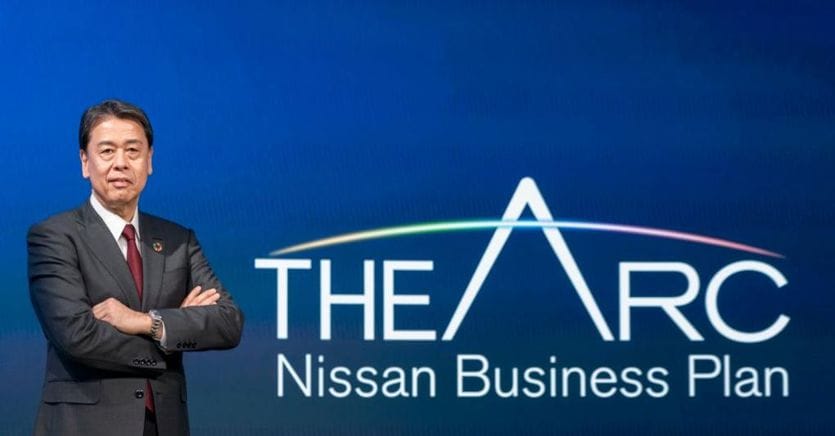Listen to the audio version of the article
Nissan Motor unveiled The Arc, its new business plan to drive value and strengthen competitiveness. The plan focuses on a large-scale product offensive, increased electrification, new approaches to engineering and manufacturing, the adoption of new technologies and the use of strategic partnerships to increase sales and improve profitability.
The plan is positioned as a bridge between the Nissan Next business transformation plan covering the period from fiscal 2020 to 2023 and Nissan Ambition 2030, the company’s long-term vision. The new plan is divided into medium-term “imperatives” for fiscal years 2024 to 2026 and medium-to-long-term actions to take place through 2030. Under the two-part plan, Nissan will first take actions to ensure growth of volumes through a tailored regional strategy and will prepare for an accelerated transition to electric vehicles, supported by a balanced electrified/ICE product portfolio, volume growth in key markets and financial discipline.
Through these initiatives Nissan aims to increase annual sales by 1 million units and increase its operating profit margin to above 6%, both by the end of fiscal 2026. This will pave the way for the second part of the plan, aimed at enabling the transition to electric vehicles and achieving long-term profitable growth, supported by smart partnerships, increased EV competitiveness, differentiated innovations and new revenue streams. By fiscal 2030, Nissan expects revenue potential of 2.5 trillion yen from new business opportunities. Specifically, Nissan plans to launch 30 new models over the next three years, including 16 electrified and 14 ICE, to meet the diversified needs of customers in markets where the pace of electrification is different. Nissan plans to launch a total of 34 electrified models from fiscal 2024 to 2030 to cover all segments, with the EV model mix expected to represent 40% globally by 2026 and rising to 60% by the end of decade.
By 2026, the plan includes diversified actions and objectives for all markets (Americas, China, Japan, Africa, Middle East, India, Europe and Oceania). The product offensive will be supported by new development and manufacturing approaches aimed at making BEVs more affordable and increasing profitability. By developing EVs across individual product families, integrating powertrains, using next-generation modular manufacturing, group sourcing and battery innovations, Nissan aims to reduce the cost of next-generation BEVs by 30% compared to the current model Ariya crossover and achieve cost parity between EV and ICE models by 2030.
In the area of family development alone, the cost of subsequent vehicles, i.e. those developed based on the family’s main vehicle, can be reduced by 50%, the variation of trim parts reduced by 70% and development times decreased by four months. By adopting modular manufacturing, the vehicle assembly line will be shortened, reducing the vehicle’s time on the road by 20%. As part of the Arc plan, the Japanese company expects more plants in Japan and abroad to adopt the Nissan Intelligent Factory concept. These include Oppama and Nissan Motor Kyushu in Japan, the Sunderland plant in the UK and the Guangzhou and Smyrna plants in the US from 2026. Meanwhile the EV 36 Zero production approach will be extended from Sunderland in the UK to to other plants including Canton, Decherd and Smyrna in the United States and Tochigi and Kyushu in Japan from fiscal 2025 through 2028. The plan includes proposals to accelerate the evolution of intelligent vehicle technologies such as the new ProPILOT driver assistance system generation, which uses autonomous driving technology in different situations. Nissan will offer NCM li-ion, LFP and all advanced solid-state batteries to provide diversified BEVs and meet different customer needs. The Japanese company will significantly improve the NCM lithium-ion batteries, reducing fast charging time by 50% and increasing energy density by 50% compared to the Ariya. The LFP batteries, which will be developed and produced in Japan, will be made at a 30% cost reduction compared to the Sakura EV mini vehicle. New electric vehicles with enhanced NCM li-ion, LFP and all-solid-state batteries will be launched in 2028. Nissan will leverage strategic partnerships to remain competitive and offer a global portfolio of products and technologies. The alliance with Renault and Mitsubishi in Europe, LATAM, ASEAN and India will also continue. In China, Nissan will use its local resources, while at the same time exploring new partnerships in Japan and the United States. The batteries will be developed and purchased with partners to reach 135 GWh of global capacity. Underpinning the plan is solid financial discipline, enabling a stable Capex and R&D investment ratio to net revenue of between 7% and 8%, excluding investments in battery capacity. Additionally, Nissan plans to invest more than 400 billion yen in battery capacity. Meanwhile, investment in electrification will gradually increase, reaching more than 70% by fiscal 2026. Nissan aims to maintain net cash at a level of 1 trillion yen throughout the Arc plan period.
